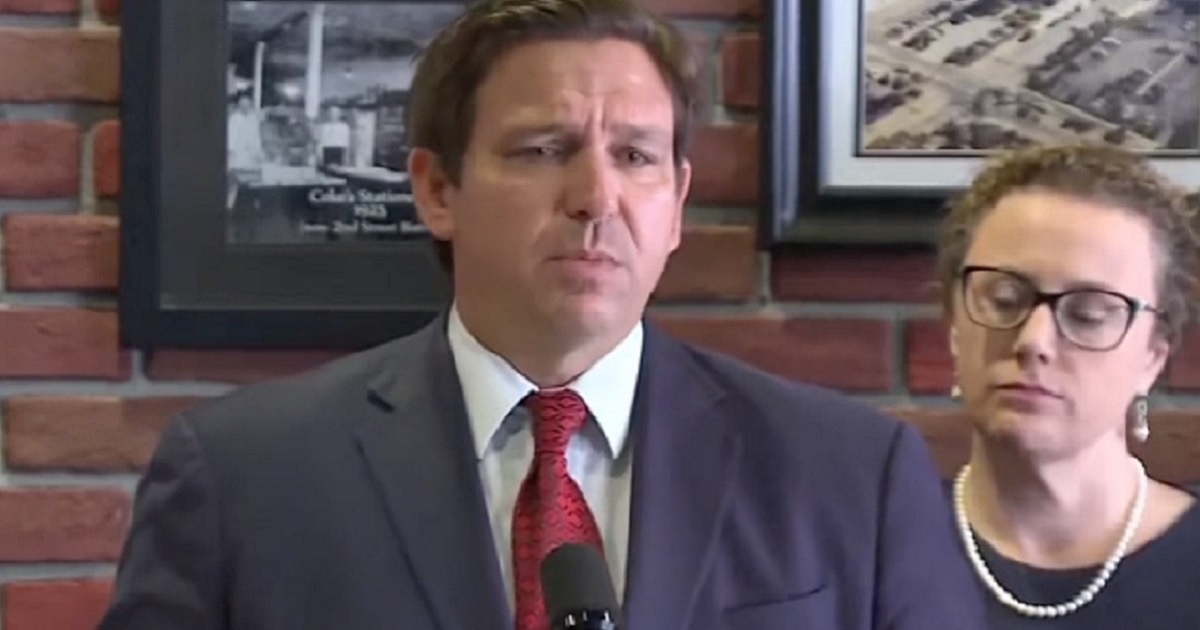Florida Gov. Ron DeSantis told reporters precisely how he feels every member of the House and Senate who voted for the so-called Inflation Reduction Act of 2022 should be dealt with.
During a speaking event Tuesday in Fort Pierce, Florida, DeSantis took particular issue with the aspect of the bill that included an $80 billion funding boost for the IRS and would enable the agency to hire over 80,000 new personnel who will be largely focused on tax enforcement.
“If they go after you, a lot of times they’re going to be able to find something, especially if you don’t have an account or you don’t have lawyers,” he said. “So I thought it was really, really reprehensible that they’d be mobilizing 87,000 IRS agents.”
Gov. Ron DeSantis: “I think every member of Congress that voted for that bill should be required to be audited every year by the IRS.” pic.twitter.com/c1UhkFOE3U
— The Post Millennial (@TPostMillennial) August 30, 2022
“I think every member of Congress that voted for that bill should be required to be audited every year by the IRS,” DeSantis said, as those in attendance responded with laughter and applause.
The bill was entirely on Democratic votes. Not a single Republican vote in either the House or the Senate supported it. (As Fox News reported, House Speaker Nancy Pelosi said they voted against “Mother Earth.”)
Biden administration officials claim the money for the IRS will go “improve taxpayer service, modernize outdated technological infrastructure, and increase equity in the tax system by enforcing the tax laws against those high-earners, large corporations, and complex partnerships who today do not pay what they owe.”
In a letter to IRS Commissioner Charles P. Rettig, Treasury Secretary Janet Yellen wrote:
“Specifically, I direct that any additional resources — including any new personnel or auditors that are hired — shall not be used to increase the share of small business or households below the $400,000 threshold that are audited relative to historical levels.”
DeSantis isn’t buying it. On Aug. 17, the day after President Joe Biden signed the bill into law, called the passage of the bill a “a middle finger” to the American people.
“I think of all the things that have come out of Washington that have been outrageous, this has got to be pretty close to the top,” he said.
“And I think it was basically just a middle finger to the American public.”
JUST IN: Gov. Ron DeSantis says hiring 87,000 IRS agents is a “middle finger” to Americans
“They’re not putting very much might at the border, I can tell you that right now…” pic.twitter.com/LtzLZm1LfY
— Florida’s Voice (@FLVoiceNews) August 17, 2022
“This is what they think of you? All these problems that we have to deal with. And they think the way is to do 87,000 IRS agents?” DeSantis said.
“They’re not putting very much might down at the border I can tell you that right now. But they want to be able to do it and unleash them on American taxpayers.”
According to TheBlaze, DeSantis said the bill would target Americans whom “the government doesn’t like.”
TheBlaze reported that DeSantis also took aim at Biden’s announcement Aug. 24 that the government would wipe out huge swathes of student-loan debt. As announced last week, the White House plans to wipe “cancel” $10,000 for borrowers who earn less than $125,000 annually, with those who received federal Pell grants getting $20,000 canceled.
DeSantis was critical of the Biden plans for student loan forgiveness long before Biden issued his executive order.
At a news conference in Williston, Florida, in April, according to Insider, he lambasted the idea.
“My view is: Why would you make a truck driver, or a waitress, or a construction worker pay off the debt for somebody that got a Ph.D. in gender studies? That’s wrong,” he said.
“Going to a four-year brick-and-ivy university is not the only way you can be successful,” DeSantis said, according to Insider.
“Honestly, for many people it’s not the best way,” he added. “You look at how much people have gone into debt, and then they end up with degrees in things like Zombie studies, and then what happens? They end up working where they could have worked at a high school anyways.”
This article appeared originally on The Western Journal.

























 Continue with Google
Continue with Google